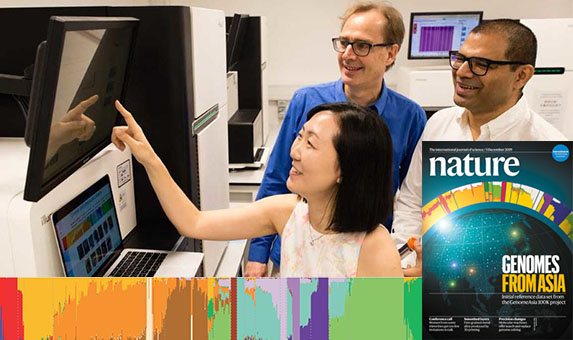Diversity and origins of Asian people – ASE Asst Prof Kim Hie Lim and colleagues publish “Genetic Map of Asia” in Nature

ASE Asst Prof Kim Hie Lim is one of the lead authors of an important study published in Nature today, which reveals the human genome of Asians in more detail and at larger scale than ever before. The study was carried out through the GenomeAsia 100K consortium, which is hosted by NTU. The study covers 64 different Asian countries, 219 population groups, and 1,739 genomes, which is the widest coverage of genetic diversity in Asia to date. It provides what the authors call a “genetic map for Asia”. Asst Prof Kim Hie Lim and her colleagues at SCELSE have led the work of compiling and analysing the very large data set with the help of the National Supercomputing Centre Singapore (NSCC) and international collaborators.
Asians constitute over 40% of the world’s population, but despite that, people of Asian descent have previously accounted for only six per cent of the world’s recorded genome sequences (since the human genome was first sequenced in 2003). This study is a step towards addressing this geographical bias in medical and genetic research. The knowledge from this study is valuable primarily in two fields of study; firstly, it can help us understand diseases unique to Asians, and enables better precision medicine and identification of drugs that may carry higher risk of adverse reactions for certain ethnic groups. Secondly, it tells a story of historic origin and unexpectedly high genetic diversity of the various population groups of Asia.
Precision medicine
The DNA of a human consists of tiny building blocks called nucleotides. Every human has approximately 3.2 billion different nucleotides in their genome, which make up their DNA ‘code’. It’s estimated that for the genomes of any two people, 99.9 % of this code is the same, but on average we differ from each other by 0.1 % of our genome, or three million nucleotides. Over multiple generations, this genetic variance has helped humankind adapt to environmental conditions and make us resilient to local diseases, but it also results in a differential response to many medicines depending on these genetic adaptations.
This new study paves the way for medical science specifically directed towards people of Asian heritage. SCELSE Professor Stephan C. Schuster is a co-leader of the study and the consortium’s scientific chairman. He comments: “GenomeAsia 100K is a significant and far-reaching project that will affect the well-being and health of Asians worldwide. It is a great honour for Singapore and NTU to be hosting it, and I hope that this Asian-focused study serves as a first stepping stone for the advancement of health care and precision medicine in Asia.” Seoul National University Bundang Hospital Prof Jeong-Sun Seo, Consortium scientific co-chair, Chairman of Macrogen, says, “I hope this Asian-focused study serves as a stepping stone for the democratization of health care and precision medicine in Asia.”
Diversity and origin of Asian peoples
The study has benefitted from thousands of blood and saliva samples collected by scientists and anthropologists from donors across Asia over the course of the last three decades, in hopes that one day a deeper analysis to gain insights into the Asian community can be done. Of particular interest were participants from remote and isolated communities, get the largest possible variation of different genomes. And large variation is just what they found; one of the major contributions of the study is the incredible diversity found within Asian population groups. While people of European ancestry all originate from the same ancestral lineage, in the Asian genetic material, at least 10 such lineages can be traced. Populations from India, Malaysia and Indonesia in particular, stand out as stemming from many different ancestral populations. Past demographic events, such as reduced or increased population sizes, migration, or isolation all leave a reflection in our genome. Thanks to this study, we now have many more clues to the demographic history of Asia.
Read the original article here: The GenomeAsia 100K Project enables genetic discoveries across Asia

